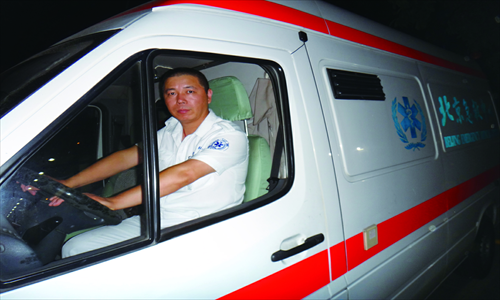The challenging job of a Beijing ambulance driver

Doctors and nurses have long received respect due to their dedication to saving people's lives, yet the contributions of ambulance drivers are often overlooked, despite doing a related and very valuable job.
This certainly is evident when speaking to 36-year-old Yu Lianfeng, who has been an ambulance driver for 10 years.
He spoke of frightening experiences during the SARS epidemic in 2003 and rescuing people from earthquake-ravaged Wenchuan, Sichuan Province, in 2008. The native Beijinger's work is simultaneously scary and demanding, and has been just as defined by happiness as it has by sadness. When he thinks of the lives he has saved though, he knows it has been worthwhile.
Initially Yu did not become an ambulance driver due to a burning passion to save lives. Yu really fell into the job because he loved vehicles. As a result, his friends suggested the occupation to him. Soon after taking it, he realized the job would not be as easy as he thought.
In order to become a qualified ambulance driver, Yu needed both a driving license and knowledge of basic first aid.
"We need to aid rescue efforts, which can include resuscitating people," he said, confessing that he used to feel sick by the sight of blood, but no longer does.
According to Yu, ambulance drivers experience "the three highs," which are high tension, high danger and high concentration. "Other drivers cannot break traffic laws, but the reverse is the case for us," he said. "You need to be twice as focused on driving. Otherwise pedestrians, patients, you and your colleagues will all be in danger," he explained, adding that when he drives through a red light, it is crucial to switch on the emergency lights and sirens, as well as slow down in case people do not see him. Sadly accidents still happen and Yu's colleague once fatally injured a pedestrian on the job.
Traffic congestion in Beijing makes matters even more difficult for Yu and other ambulance drivers. Half of the time, the side of the road that has been allocated for emergency use is occupied by other cars. "Fortunately up to 90 percent of vehicles give way immediately in the same way they do on the roads," said Yu. "Since there is no mandatory law to offer priority of way to ambulances, people do this purely based on their own conscience."
On top of driving and administering first aid, Yu has to offer psychological help. "One time an elderly person traveling to Beijing called the ambulance once every four days," Yu recalled. "He was physically fine, but panicked due to being so far away from his children." Yu and his team tried to reassure the man that nothing was wrong.
In another instance, he arrived at the scene of an emergency and was accosted. The family of the patient were convinced the ambulance had arrived too late. "They expressed their anger with dirty words and hit my colleague," he said. "The doctor found out on the spot that the patient had actually already died in their sleep," he said.
Incidents like this have made Yu realize the importance of being patient. However, his patience reaches its limits when people make prank calls for ambulances. Almost every month, Yu has to deal with some form of hoax, when people call for an ambulance just for fun.
Sometimes people also phone for an ambulance to deal with trivial matters. Yu was once called by an old person, who wanted assistance on the toilet. For Yu and his team, this is a waste of precious medical resources and puts those in urgent need more at risk.